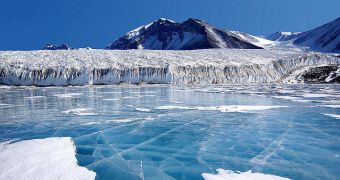According to climate researchers and polar investigators, the ices the Antarctic is currently losing are playing an important role in raising the global sea level around all continents. Scientists knew this would happen, but the influence was not expected to become noticeable so soon.
A new analysis, released an a respected international collaboration of researchers, shows that the Antarctic is contributing o more than 10 per cent of the ongoing global sea level rise.
This investigation was conducted by scientists with the British Antarctic Survey (BAS), the , Lamont-Doherty Earth Observatory (LDEO) and the National Oceanography Center (NOC).
Details of their research, which identifies the Pine Island Glacier (PIG) as a major source of ice, appear in the latest issue of the esteemed scientific journal Nature Geoscience.
The team says that the connections were found during a research meant to shed new light on how melting ices act on global seas. It is known that sea-based ice does not really influence the level oceans all that much, but climate experts also know that sea-based ice does.
The issue in Antarctica is that the ice shelfs that keep ground-based glaciers in place are melting, allowing the later to flow into the Southern Ocean at an accelerated pace.
This happens both in Antarctica and in Greenland, which are the largest reservoirs of ground-based ice in the world. If these two regions lose their ice, then global sea levels would rise by several feet.
During the new research, the collaboration used an underwater autonomous vehicle called the Autosub to investigate what lies underneath the Pine Island Glacier's floating ice shelf. The main discovery was the existence of an underwater ridge that retained the structure from flowing too fast.
However, it was also determined that the ice shelf had become loose from its supporting ridge over the past few years. As the ices thinned, they lost grip with the underwater ridge, the team explains.
This made the glaciers move a lot faster, and flow into the ocean at higher speeds than ever before. The movements of the Pine Island Glacier are bound to influence surrounding landmasses as well.
“Since our first measurements in the Amundsen Sea, estimates of Antarctica's recent contributions to sea level rise have changed from near-zero to significant and increasing,” says team member Stan Jacobs in a statement.
“Now finding that the PIG's grounding line has recently retreated more than 30 [kilometers] from a shallow ridge into deeper water, where it is pursued by a warming ocean, only adds to our concern that this region is indeed the 'weak underbelly' of the West Antarctic Ice Sheet,” he adds.
“Increased melting of continental ice also appears to be the primary cause of persistent ocean freshening and other impacts, both locally and downstream in the Ross Sea,” the expert concludes, quoted by Daily Galaxy.

 14 DAY TRIAL //
14 DAY TRIAL //